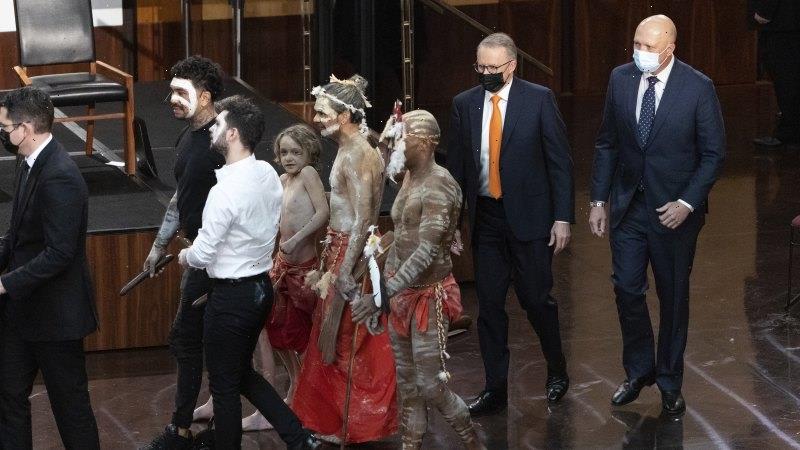In principle, at a time when self-determination for Indigenous people is widely accepted as the best outcome, a Voice to parliament entrenched in the Constitution would appear a policy right for the time. In practice, as became evident this week in parliament, it is a policy that has many hurdles to overcome.
It is five years since a large and representative body of Indigenous leaders issued the Uluru Statement from the Heart calling for a Voice to parliament and a Makarrata Commission to oversee treaty-making and truth-telling. The Voice it proposed would operate as an advisory body to parliamentarians, enabling Aboriginal and Torres Strait Islanders to provide advice on laws and policies that impact them.
Peter Dutton and Anthony Albanese during a welcome to Country ceremony to mark the start of the 47th parliament.Credit:Alex Ellinghausen
While treaty and truth-telling are on Labor’s agenda, it has made the Voice to parliament its highest priority, with Prime Minister Anthony Albanese committing to holding a referendum in his first term.
But the headwinds against these efforts are growing. Conservative Northern Territory senator Jacinta Nampijinpa Price, in her maiden speech to parliament, made an impassioned plea against “false narratives” of racism and calling the push for an Indigenous Voice to parliament a symbolic gesture that could divide black and white Australia.
In a red flag for Albanese, Price singled out what she called “platitudes of motherhood statements from our now prime minister”, saying he had suggested “without any evidence whatsoever, that our Voice to parliament bestowed upon us through the virtuous act of symbolic gesture by this government is what is going to empower us”.
A day after Price delivered her fervent speech, Liberal spokespeople Tony Pasin, Phillip Thompson and Claire Chandler have all declared they have serious reservations about the lack of details about the Voice to parliament or the referendum.
The government responded this week to the criticism that there was little public detail on how the Voice to parliament would work, with Senator Pat Dodson, who Albanese appointed a special envoy for the Voice to parliament, telling The Australian that he hoped an “exposure document” setting out key elements of the proposed model would be ready before Christmas and that it would be a part of an education campaign in the lead-up to a referendum.
Despite clear rumblings in his party, Opposition Leader Peter Dutton has left the door open to supporting a referendum, but he is waiting to see the detail and wants “the symbolic … to be accompanied by practical responses”. There is much riding on his final decision.
Since 1901, there have been 19 referendums, proposing 44 changes to the Constitution, of which only eight have managed to get the green light. That poor strike rate has made governments hesitant to back referendums. However, it should also be remembered the referendum in 1967 that enabled the Commonwealth to enact laws for Indigenous Australians and to remove the prohibition against including them in population counts in the Commonwealth or a state passed with the backing of more than 90 per cent of Australians, the highest level of support for any referendum since Federation.
But to think that a Voice to parliament would garner enough votes to pass without bipartisan support is foolhardy. Without the backing of the Coalition, and probably the Greens, it would have little chance of becoming a reality.
On Saturday, Albanese will deliver a speech at the Garma Indigenous cultural festival in the Northern Territory. He will reveal his preferred wording of the referendum question, which simply asks whether Australians support the Voice, and the addition to the constitution, which only says a Voice should exist and leaves it to the parliament to determine its authority, functions and composition.
While this is a constructive step in putting flesh on the bones of this proposal, there needs to be more.
Working through how the Voice would be selected, who would be eligible and what authority it would have over legislation, done in a bipartisan way, could and should be the means by which it gathers support from all sides of politics. It would also assure the public that it has been through a rigorous process of negotiation before landing on a final position. At a time when culture wars can be easily ignited through an array of platforms, a lack of detail would leave a vacuum for critics to easily fill.
The government must also strengthen its argument that this is not just a symbolic gesture. That is where the detail will assist. Revealing how the Voice can and will be able to make material differences to government policy should highlight how this change could have a real impact on the lives of First Nations people.
There will only ever be one chance for a referendum on a Voice to parliament to be passed. The Age supports the principle, but the process needs to be scrutinised. This is a time when the government and nation must do its best to rise to the occasion.
Gay Alcorn sends a newsletter to subscribers each week. Sign up to receive her Note from the Editor.
Most Viewed in Politics
From our partners
Source: Read Full Article

